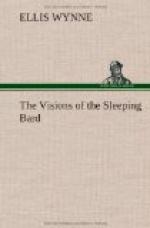They next come to the Street of Lucre, full of Spaniards, Dutchmen and Jews, and here too, are conquerors and their soldiers, justices and their bribers, doctors, misers, merchants and userers, shopmen, clippers, taverners, drovers, and the like. An election of Treasurer to the Princess is going on—stewards, money-lenders, lawyers and merchants being candidates, and whoso was proved the richest should obtain the post. The Bard then comes to the Street of Pleasure, where all manner of seductive joys abound. He passes through scenes of debauchery and drunken riot, and comes to a veritable Bedlam, where seven good fellows— a tinker, a dyer, a smith and a miner, a chimney-sweep, a bard and a parson—are enjoying a carousal. He beholds the Court of Belial’s second daughter, Hypocrisy, and sees a funeral go by where all the mourners are false. A noble lord appears, with his lady at his side, and has a talk with old Money-bags who has lent him money on his lands—all three being apt pupils of Hypocrisy.
The Angel then takes him to the churches of the City; and first they come to a pagan temple where the human form, the sun and moon, and various other objects are worshipped. Thence they come to a barn where Dissenters imitate preaching, and to an English church where many practise all manner of hypocrisy. The Bard then leaves the City of Destruction and makes for the celestial City. He beholds one man part from his friends and, refusing to be persuaded by them, hasten towards Emmanuel’s City. The gateway is narrow and mean, while on the walls are watchmen urging on those that are fleeing from Destruction. Groups from the various streets arrive and claim admittance, but, being unable to leave their sins, have to return. The Bard and his Guide enter, and passing by the Well of Repentance come in view of the Catholic Church, the transept of which is the Church of England, with Queen Anne enthroned above, holding the Sword of Justice in the left hand, and the Sword of the Spirit in the right. Suddenly there is a call to arms, the sky darkens, and Belial himself advances against the Church, with his earthly princes and their armies. The Pope and Lewis of France, the Turks and Muscovites fall upon England and her German allies, but, the angels assisting, they are vanquished; the infernal hosts, too, give way and are hurled headlong from the sky; whereupon the Bard awakes.
II. THE VISION OF DEATH.
It is a cold, winter’s night and the Bard lies abed meditating upon the brevity of life, when Sleep and his sister Nightmare pay him a visit, and after a long parley, constrain him to accompany them to the Court of their brother Death. Hieing away through forests and dales, and over rivers and rocks, they alight at one of the rear portals of the City of Destruction which opens upon a murky region—the chambers of Death. On all hands are myriads of doors leading into the Land of Oblivion, each guarded by the particular death-imp, whose name was inscribed above it. The Bard passes by the portals of Hunger, where misers, idlers and gossips enter, of Cold, where scholars and travellers go through, of Fear, Love, Envy and Ambition.




